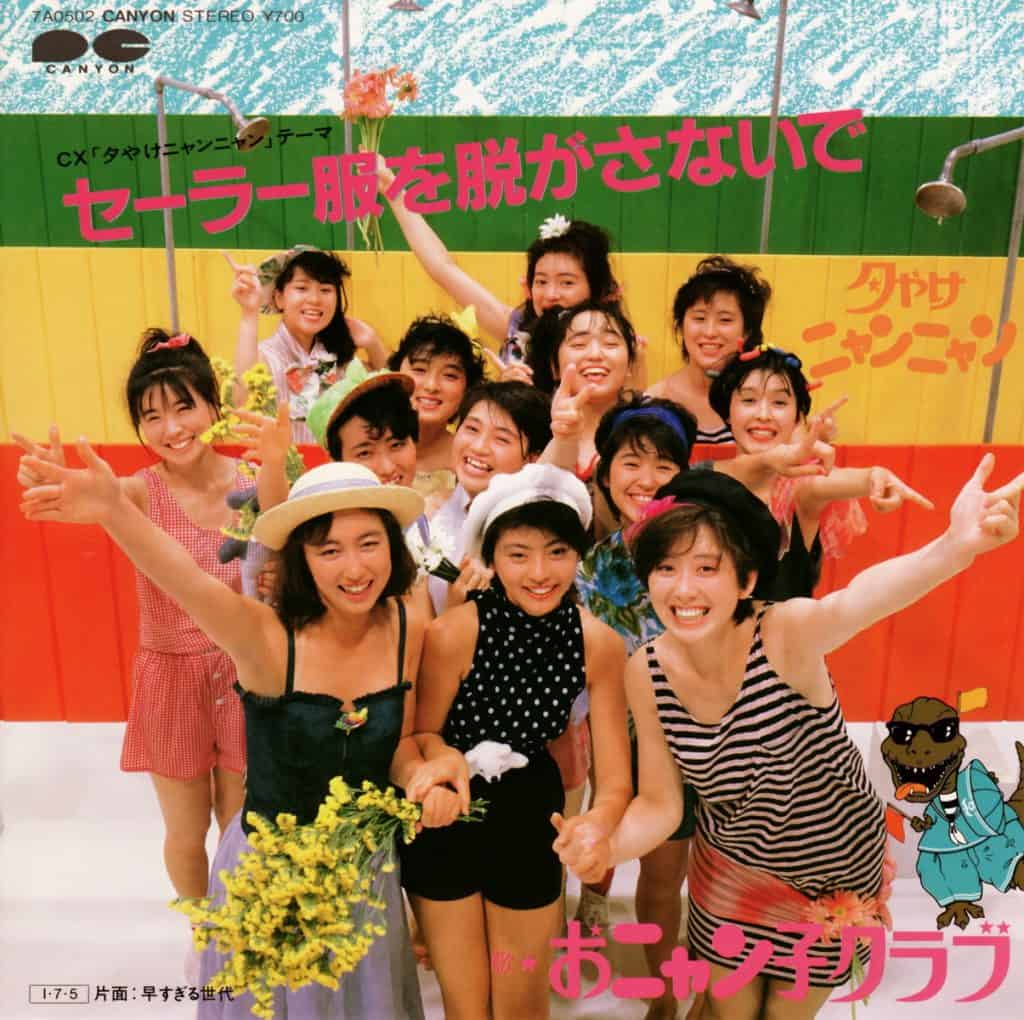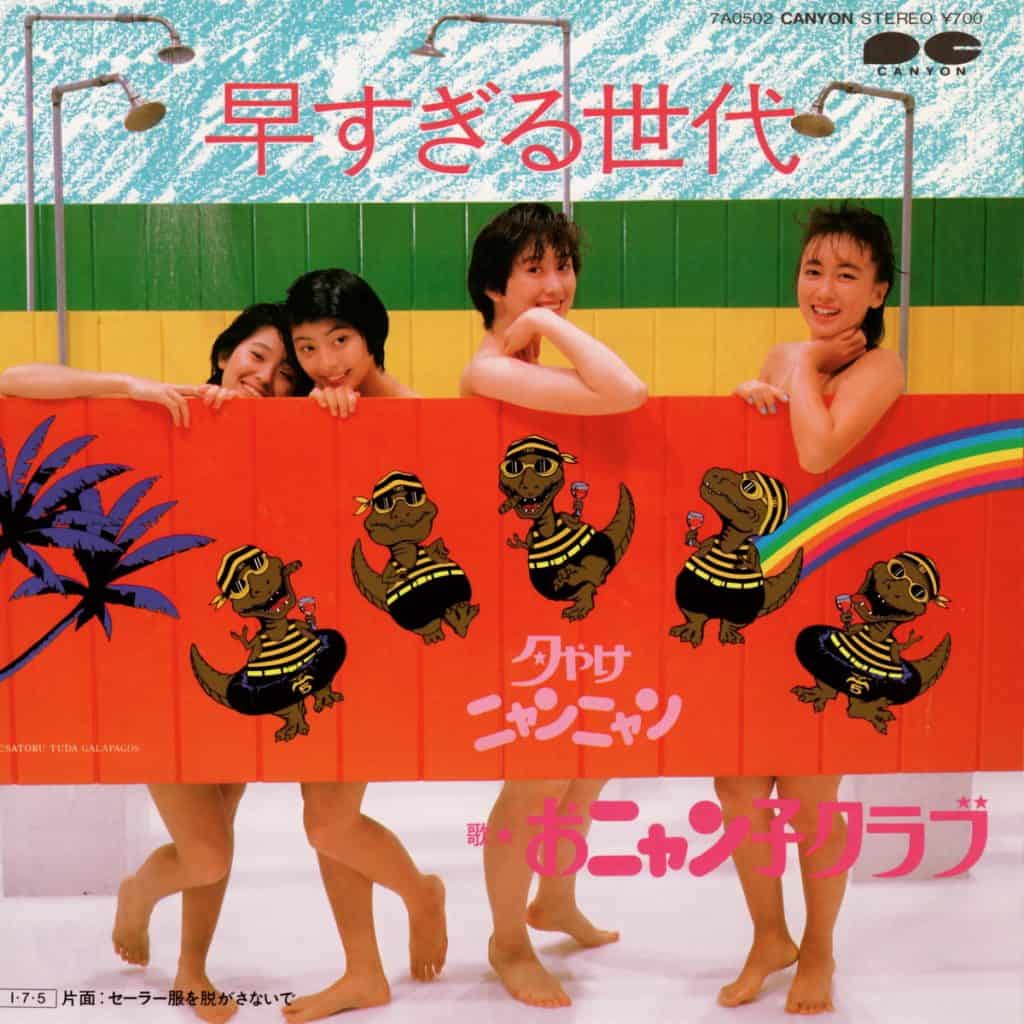
- Who Are Onyanko Club?
- What does the name Onyanko Club mean?
- About the show 夕やけニャンニャン Yuyake Nyan Nyan
- The Significance of Yuyake Nyan Nyan, All Night Fuji and Onyanko Club
- Who Sang on Sailor Fuku Wo Nugasanaide?
- Who Wrote & Produced Sailor Fuku Wo Nugasanaide?
- Who played on Sailor Fuku Wo Nugasanaide?
- Vocabulary used in Sailor Fuku Wo Nugasanaide
The song Sailor Fuku Wo Nugasanaide, sung by Onyanko Club, represented a new stage in the evolution of the Japanese idol group. It was an early iteration of the large-number-of-young girls concept, engineered by producers such as Yasushi Akimoto, that would ultimately lead to the AKB48 and 48 franchise groups.
Who Are Onyanko Club?
Onyanko Club was a 14-member girl group that appeared as part of a popular evening TV show. The show was called 夕やけニャンニャン Yuyake Nyan Nyan and was a Fuji Terebi television program that aired every weekday between five and six pm, between the years 1985-1987.
The show had a segment called アイドルを探せ (Idol Search!). High school girls would audition. If they passed they could be part of the group that would be featured on the show. The group took their name from the name of the show and became Onyanko Club.

What does the name Onyanko Club mean?
Onyanko is a cute name for “cat” or “pussycat” in Japanese. “Nyan” is equivalent to the word “meow” and is the sound a cat makes. So the name could be translated as something like “The Meow-Girls Club”.
About the show 夕やけニャンニャン Yuyake Nyan Nyan
Yuyake Nyan Nyan grew out of another pre-existing Fuji Terebi program called オールナイトフジ (All Night Fuji). This show was a live-to-air, late night television show that featured female university students singing, dancing, often in a fairly sexually explicit way, mixed variety and comedy entertainment.
In 1985, All Night Fuji show did a special feature called 『オールナイトフジ女子高生スペシャル』All Night Fuji High School Girls Special. The program was aimed at school aged boys and proved to be successful enough to spawn a stand alone program.
The Significance of Yuyake Nyan Nyan, All Night Fuji and Onyanko Club
All Night Fuji had turned female university students into fetish in Japan. With the creation of Yuyake Nyan Nyan, this fetishism was turned towards an even younger age group, the High school girl. In this way, Yuyake Nyan Nyan, and Onyanko Club, contributed greatly to the outrageously fetishsed image of the Jyoshi kosei (JK) image of the high school girl which remains popular to this day.
About セーラー服を脱がさないで sailor fuku wo nugasanaide (don’t take off my sailor-style school uniform)
The lyrics to Sailor fuku wo nugasanai de were written by Yasushi Akimoto, who would later become the producer mastermind behind AKB48 and the 48 franchise of mega-girl-groups. We’ve done a post, youtube & podcast about Yasushi Akimoto’s lyrics here.
It expresses a school-age girl’s blossoming, but uncertain and conflicted, desire to explore her sexuality. The song opens with the protagonist exhorting a potential lover not to undress her – at least for the time being.
セーラー服を脱がさないで
今はダメよ 我慢なさって
セーラー服を脱がさないで
嫌よダメよ こんなところじゃ
Don’t take off my sailor-style school uniform
Not now! Please be patient
Don’t take off my sailor-style school uniform
I don’t want you to, no, not in a place like this
But by the third stanza of the song, we see the protagonist making something of an about face to express an unabashed desire to have sex:
友達より早く
エッチをしたいけど
キスから先に進めない
憶病すぎるの
I want to have sex
Before my friends do
But I’m just so timid
That I find it hard to get past kissing
But even here, there is some ambiguity in the use of the word エッチ ecchi.
エッチecchi can mean sex. But it can also mean “fooling around” or “playing” in a sexual way.
Further, it has been argued that in 1985 the term エッチ ecchi, which is a Japanisation of the English letter “H”, was even more ambiguous term at the time. Indeed, this song seems to have lodged it further in the public consciousness as a word that fairly explicitly refers to intercourse.
Either way, it is fairly clear that the song is about a young girl’s sexual urges being expressed in the context of her innocence and larger social context.
The fact that the song is written by a male much older than the imagined protagonist, to be used on a show that revelled in the fetishisation of the school girl, make the lyrics uncomfortable in the post #metoo era.
Sailor Fuku Wo Nugasanaide Lyrics in Japanese and English
| セーラー服を脱がさないで sailor fuku wo nugasanaide Japanese lyrics | セーラー服を脱がさないで sailor fuku wo nugasanaide lyrics in English | セーラー服を脱がさないで sailor fuku wo nugasanaide Romaji lyrics |
| セーラー服を脱がさないで今はダメよ 我慢なさってセーラー服を脱がさないで嫌よダメよ こんなところじゃ 女の子は いつでも“MI・MI・DO・SHI・MA”お勉強してるのよAh- 毎日 友達より早くエッチをしたいけどキスから先に進めない憶病すぎるの 週刊誌みたいなエッチをしたいけど全てをあげてしまうのはもったいないから…あげない セーラー服を脱がさないでスカートまで まくれちゃうでしょセーラー服を脱がさないで胸のリボン ほどかないでね 男の子はその時どうなるの?興味津々 しちゃうのよAh- 不思議ね デートに誘われてバージンじゃ つまらないパパやママは知らないの明日の外泊 ちょっぴり恐いけどバージンじゃ つまらないおばんになっちゃう その前においしいハートを…食べて | Don’t take off my sailor-style school uniform Not now! Please be patient Don’t take off my sailor-style school uniform I don’t want you to, no, not in a place like this Girls are always Mi mi do shi ma (acting like they know all about sex) Everyday I want to have sex Before my friends do But I’m just so timid That I find it hard to get past kissing I want to have sex Just like the weekly magazines But going ahead and giving it all to you Just seems such a waste. So I won’t. Don’t take off my sailor-style school uniform You’re going to even lift up my skirt, aren’t you? Don’t take off my sailor-style school uniform Don’t untie the ribbon on my breast How do boys get at times like these? I get so intrigued! It’s such a mystery It’s such a bore to be a virgin When someone asks you on a date Mum and Dad don’t know About where I’m staying tomorrow night I’m a slightly scared But it’s such a bore to be a virgin I’m going to be an old maid! Before I do Eat out my tasty heart | sērāfuku o nugasanaideima wa dameyo gaman nasattesērāfuku o nugasanaideiyayo dameyo konna tokoro ja onnanoko wa itsu demo“ MI MI DO SHI MA ”o benkyō shiterunoyoAh - mainichi tomodachi yori hayakuecchi o shitaikedokisu kara saki ni susumenaiokubyō sugiruno shūkanshi mitainaecchi o shitaikedosubete o ageteshimau no wamottainaikara … agenai sērāfuku o nugasanaidesukāto made makurechaudeshosērāfuku o nugasanaidemune no ribon hodokanaidene otokonoko wa sono tokidō naru no ?kyōmishinshin shichaunoyoAh - fushigine dēto ni sasowaretebājin ja tsumaranaipapa ya mama wa shiranainoashita no gaihaku choppiri kowaikedobājin ja tsumaranaio ban ni nacchau sono mae nioishī hāto o … tabete |
Who Sang on Sailor Fuku Wo Nugasanaide?
The solo singers on sailor fuku wo nugasanaide comprised four people:
Eri Nitta 新田恵利 (Group member number 4)
Miharu Nakajima 中島美春 (Group member number 5)
Satomi Fukunaga 福永恵規 (Group member number 11)
Kazuko Utsumi 内海和子 (Group member number 13)
Who Wrote & Produced Sailor Fuku Wo Nugasanaide?
Lyricist: Yasushi Akimoto 秋元康
Composer:Hitoshi Sato 佐藤準 (keyboardist/arranger)
Producers: Hiroshi Ishida and Kazuji Kasai (笠井一二)
Arranger: Hitoshi Sato(佐藤準)
Who played on Sailor Fuku Wo Nugasanaide?
bass guitar and electric bass guitar:
Shigeru Okazawa (岡沢茂)
drums:
Jun Aoyama (青山純)
electric guitar:
Masaki Matsubara (松原正樹)
keyboard:
Hitoshi Sato (佐藤準)
Vocabulary used in Sailor Fuku Wo Nugasanaide
セーラー服 (セーラーふく)
sailor suit; middy uniform
脱がす (ぬがす)
to strip someone; to help someone remove (clothes)
今 (いま)
now; the present time; just now; soon; immediately; (one) more
駄目 (だめ、ダメ)
no good; not serving its purpose; useless; broken; hopeless; wasted; in vain; purposeless; cannot; must not; not allowed
我慢 (がまん)
patience; endurance; perseverance; tolerance; self-control; self-denial
為さる (なさる)
to do
嫌 (いや、や)
disagreeable; detestable; unpleasant; reluctant
こんな (こんな)
such (about something or someone close to the speaker (including the speaker), or about ideas expressed by the speaker); like this
所 (ところ、とこ)
place; spot; scene; site; address; district; area; locality; one’s house; point; part; space; room; whereupon; as a result; about to; on the verge of; was just doing; was in the process of doing; have just done; just finished doing
じゃあ (じゃあ、じゃ)
then; well; so; well then; combination of ‘de’ and ‘wa’ particles; plain copula
女の子 (おんなのこ、おんなのコ、おんにゃのこ)
girl
何時 (いつ)
when; how soon
勉強 (べんきょう)
study; diligence; discount; reduction
毎日 (まいにち)
every day
友達 (ともだち)
friend; companion
より (より)
than; from; out of; since; at; on; except; but; other than; more
早い (はやい)
fast; quick; hasty; brisk; early (in the day, etc.); premature; (too) soon; not yet; (too) early; easy; simple; quick
H (エッチ、エイチ)
H; h; indecent; lewd; frisky; sexy; sexual intercourse; copulation
キス (キス、キッス)
kiss
進める (すすめる)
to advance; to promote; to hasten
臆病 (おくびょう)
cowardice; timidity
過ぎる (すぎる)
to pass through; to pass by; to go beyond; to pass (i.e. of time); to elapse; to have expired; to have ended; to be over; to exceed; to surpass; to be above; to be no more than …; to be excessive; to be too much; to be too …
週刊誌 (しゅうかんし)
weekly publication; weekly magazine
全て (すべて)
everything; all; the whole; entirely; completely; wholly; all
上げる (あげる)
to raise; to elevate; to do up (one’s hair); to fly (a kite, etc.); to launch (fireworks, etc.); to surface (a submarine, etc.); to land (a boat); to deep-fry; to show someone (into a room); to summon (for geishas, etc.); to send someone (away); to enrol (one’s child in school); to enroll; to increase (price, quality, status, etc.); to develop (talent, skill); to improve; to make (a loud sound); to raise (one’s voice); to earn (something desirable); to praise; to give (an example, etc.); to cite; to summon up (all of one’s energy, etc.); to arrest; to nominate; to give; to offer up (incense, a prayer, etc.) to the gods (or Buddha, etc.); to bear (a child); to conduct (a ceremony, esp. a wedding); (of the tide) to come in; to vomit; to do for (the sake of someone else); to complete …; to humbly do …
勿体ない (もったいない)
impious; profane; sacrilegious; too good; more than one deserves; unworthy of; wasteful
迄 (まで)
until (a time); till; to; up to; to (a place); as far as; to (an extent); up to; so far as; even; only; merely
捲れる (まくれる、めくれる)
to be (get) turned up (inside out)
胸 (むね、むな)
chest; breast; breasts; bosom; bust; heart; lungs; stomach; heart; mind; feelings
リボン (リボン)
ribbon
解く (ほどく)
to unfasten; to untie; to unwrap (e.g. parcel)
男の子 (おとこのこ、おとこのコ)
boy; male child; baby boy
成る (なる)
to become; to get; to grow; to be; to reach; to attain; to result in; to prove to be; to consist of; to be composed of; to succeed; to be complete; to change into; to be exchanged for; to play a role; to be promoted; to do …
興味津々 (きょうみしんしん)
very interesting; of absorbing interest; having a keen interest (in); being immensely curious (about)
不思議 (ふしぎ)
wonder; miracle; strange; mystery; marvel; curiosity
デート (デート)
date; go on a date
誘う (さそう、いざなう)
to invite; to ask; to call (for); to tempt; to lure; to induce
バージン (バージン)
virgin
詰らない (つまらない)
dull; uninteresting; boring; tedious; insignificant; unimportant; trifling; trivial; worthless; absurd; foolish; silly; stupid; useless; pointless; disappointing
知る (しる)
to be aware of; to know; to be conscious of; to cognize; to cognise; to notice; to feel; to understand; to comprehend; to grasp; to remember; to be acquainted with (a procedure); to experience; to go through; to learn; to be acquainted with (a person); to get to know; to concern
明日 (あした、あす、みょうにち)
tomorrow; near future
外泊 (がいはく)
spending night somewhere else (usu. away from home); sleepover; sleep over
ちょっぴり (ちょっぴり、ちょぴり)
very little bit; just a smidgin; wee bit
怖い (こわい)
scary; frightening; eerie; dreadful; (I’m) afraid
美味しい (おいしい、オイシイ)
delicious; tasty; sweet
ハート (ハート)
heart
食べる (たべる)
to eat; to live on (e.g. a salary); to live off; to subsist on
